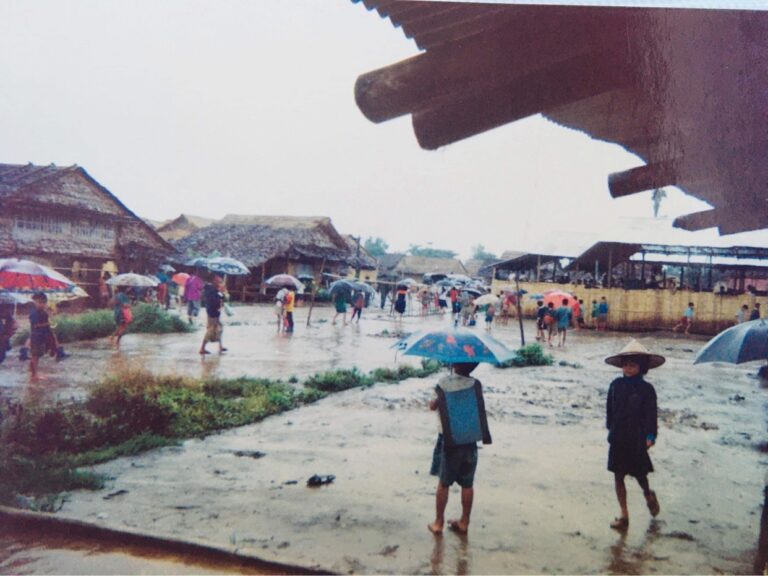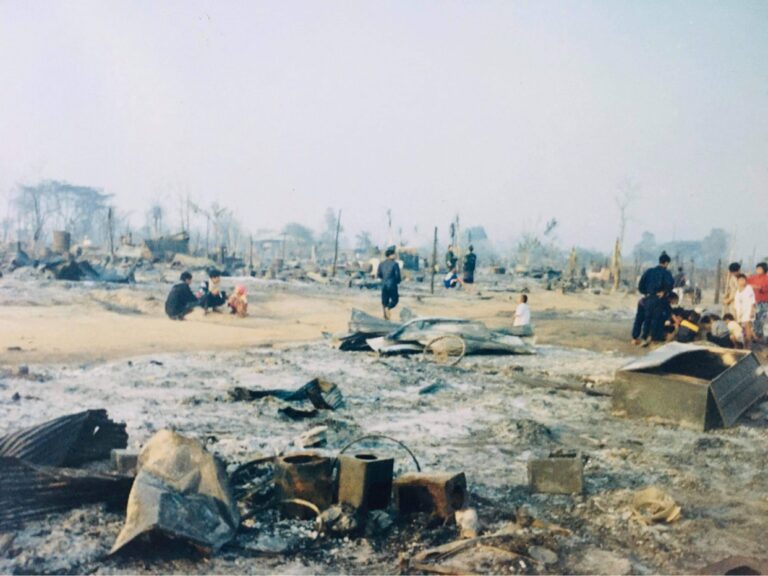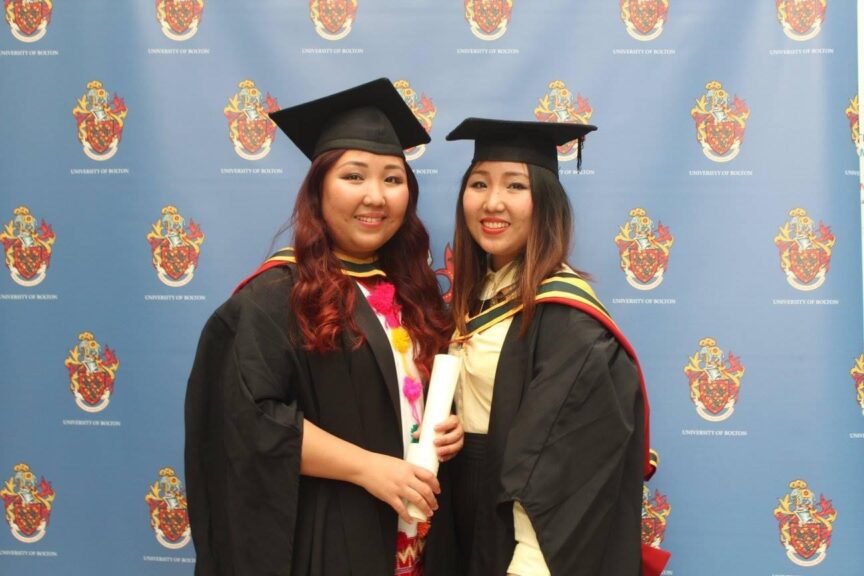“I really want this to end”, is the emotional plea made by Burmese refugee Blut Htoo Win, about the current troubles caused by the military coup in Myanamar. “Nothing has changed, and history keeps repeating itself.”
Blut was born in a refugee camp in Thailand, where her mother had fled to avoid persecution by the Burmese military. She spent the first 19 years growing up in that refugee camp where fear, poverty, insecurity and squalor were daily facts of life. Blut and her family were given a new lease of life when they migrated to Greater Manchester in 2007, along with her twin sister Blut Say, mother, grandmother, younger brother, and two cousins.
The road from Burma to Greater Manchester, has been a long and difficult one for Blut’s family. The current troubles in Myanmar, which was called Burma until 1989, where the military is once again abusing its power to seize control of the country and oppress anyone who dares criticise them – leaves Blut fearing there will be many more families displaced and suffering due to military misrule.
Burma or Myanmar? Click here to find out more.
Many Burmese, including Blut’s family, prefer to call themselves Burmese and the country Burma rather than Myanmar, the name the country was given in 1989 by a military junta that seized power in a coup in 1998, and formed the State Law and Order Restoration Council (SLORC) to rule the nation.
Burma Campaign UK (BCUK), which campaigns for human rights and democracy, calls the country Burma “as this is what Burma’s democracy movement prefers….. the dictatorship [SLORC] had no legitimacy and so no right to change the name of the country to Myanmar.”
The US and UK governments also still refer to the country as Burma, with the UK Foreign Office stating that they use that name because, “Burma’s democracy movement prefers the form ‘Burma’…”

Karen ethnic group refugees in Thailand
At just 15 years old, Blut’s mother Naw Paw* was forced to flee Burma in 1985, when the Burmese military came to her village, seized the land and looted then burned the village. The marauding military forced young men to become soldiers, while raping and killing others. Escaping to Thailand, she was placed into the Huay Kaloke refugee camp, in Tak province, about 500 km from Bangkok.
Naw belongs to the Karen ethnic group, which the Karen Human Rights Group (KHRG) and Amnesty have reported as being subject to systemic human rights abuse by the military of Myanmar and pro-Myanmar government militias. The Karen National Liberation Army was formed to defend the rights of the Karen people and there has been armed conflict between the KNLA and the Burmese then Myanmar military since the end of World War II.
Blut’s father and mother met in the camp in 1987 and Blut and her twin sister were born there. Blut’s father eventually returned to Burma but died shortly after.

Huay Kaloke camp before mortar shell and fire attack in 1998 
Huay Kaloke camp after the mortar shell attack. The majority of homes were burned to the ground.
But even in Thailand, they were not safe from the military government of Burma. Blut recalls two separate attacks on the camps in 1997 and 1998, when she was just nine years old.
During the last attack Blut and her family were violently awoken when the refugee camp was shelled with mortar fire in the middle of the night by armed militia supported by the Burmese government, who had crossed the border to attack.
Running barefoot for her life, lit by the flames of her house and the rest of the camp, as it burnt to the ground, Blut saw a pregnant woman, injured by the attack, lying there bleeding on the ground – an image which is still etched on her memory. They ran for their lives to a nearby Thai town, hoping the Burmese forces would not drop bombs there.
An estimated fifty armed attackers entered the camp after the shelling, systematically setting fire to the homes and shooting at people as they, fled killing one woman and leaving 30 to 50 wounded from shrapnel, gunfire and fire.
The Karen Human Rights Group (KHRG) report these cross-border attacks, which occurred at many different refugee camps were ignored by the Thai government, and were carried out by armed militia supported by the State Law and Order Restoration Council (SLORC), formed to govern Burma after the military coup in 1988.
Following the attack on Huay Kaloke, Blut’s family were moved to a different refugee camp, Umphiem in the Phop Phra District of Tak Province. This new camp was 12 km from the Burmese border, in a more remote mountainous area.

Life was tough and strict in the new camp. Travel outside the camp was discouraged, and they lived in a bamboo hut where she remembers looking at the stars through the hole in the roof while lying down to sleep. Every family was responsible for digging their own toilet and collecting the clean water provided for drinking and washing.
Food was provided by the NGO’s supporting the camp. Every month they were given rice, salt, oil, and fishpaste. Naw Paw would make snacks to sell, to make some extra money, and she eventually became a chef in the refugee office.
School was run in the camp by other refugees at first, but later when they were older, she was taught by foreign teachers. Blut practiced five languages: Burmese, Thai, two Karen dialects and English.
Opportunities arose to move to a new country in 2007, and Blut recalls Australia, Norway, Sweden, Canada, US, and UK agreeing to take some refugees. Out of 7,000 households in the camp, twelve were to be selected for the UK.
Since her mother had been a refugee since 1985, the family were short listed. Blut accompanied Naw Paw during the interview which would determine whether they would be able to migrate. A translator was present, but Blut also used her English skills to answer questions which contributed to the decision made to offer migration to the UK.
From Burma to Bolton
The family flew to London on 7 December 2007. Blut was amazed to see falling snow and tried to taste the snowflakes as they fell. After three days in a hotel and some sightseeing and orientation, they travelled to Bolton.
The family of six moved into a three bedroom house with a garden which Blut loved, but was still acclimatising to the colder weather.
She was just 19 years and experiencing life outside a refugee camp, in a strange country, for the first time. Blut and her sister went to the store on their first day in Bolton and using their limited English they found everyone helpful and friendly.
Blut was impressed with how organised the process of settling them into their new home was. In the following days, her family were taken to the doctor and dentist, given a case worker, a phone, and shown around Bolton. They were enrolled in college, where they were taught English and computer skills.
Due to the continuing political unrest, Blut and her mother have not been able to visit their family that still live in Burma, and are concerned about their wellbeing in the current crackdown by the military.
Burma’s past and continuing conflicts – click here to find out more
Burma has a long history of conflict. Sections of the country were seized by British India during the 1826 and 1852 Anglo-Burmese Wars. By 1886 Burma was a province of British India and secured independence from the British Empire in 1948.
Burma was in the throes of the nationwide 8888 pro-democracy protests against the previous totalitarian and oppressive government, when SLORC seized power. They proceeded to crackdown on the pro-democracy protests, imprisoning and killing many protestors. The SLORC government became more oppressive than the government it replaced and caused many more ethnic minority Burmese, such as the Karen, to flee to neighbouring countries.
It was during the 8888 protests that Aung San Suu Kyi rose to prominence as the leader of the National League for Democracy (NLD), which won a landslide election victory in 1990, which SLORC refused to recognise and put Kyi under house arrest, which lasted till 2010.
During this time Suu Kyi was lauded as a human rights and democracy paragon and awarded a Nobel Peace Prize. Her dramatic fall to pariah status internationally came when she was the leader of the NLD government in Burma, with her failure to condemn human rights abuses by the Burmese military against the Rohingya Muslim minority. The state sanctioned abuse of the Rohingya led to an estimated one million refugees fleeing to Bangladesh.
The UN set up an investigation into human rights abuses by the army against the Rohingya Muslim minority. In 2018 they released a report that accused the military of crimes against humanity, due to their activities against the Rohingya and charged Suu Kyi of failing to prevent the violence.
Burma’s latest military coup
The current troubles in Burma were sparked by an election victory by the NLD in February 2021. The Burmese military, led by General Min Aung Hlaing, declared voter fraud and overthrew the government in yet another military coup, declaring a one-year state of emergency. They are regularly blocking the internet, and arresting journalists reporting on protests against the coup and suppressing journalists from calling the take over a coup. Aung San Suu Kyi, the democratically elected leader, has been charged and moved to an undisclosed location.
There are ongoing widespread protests on the streets of Burma, opposing the coup and calling for democratic reform, and openly drawing parallels with the 8888 pro-democracy protests in 1988 [see ‘Burmas’ past and contuining conflicts’ above].
Protestors are being killed and injured by gunfire from Burmese security forces, while the military on 13 February gave itself greater powers of arrest and search, with the authority to hold people for more than 24 hours without a court ruling.
The Burmese military, while stamping on pro-democracy protests is also continuing its attacks on Karen settlements in Burma, with the Barnabus Fund and the Free Burma Rangers reporting ongoing military attacks on settlements in Northern Karen State, with an estimated 4,000 people displaced due to these latest attacks.

Safe in Salford
Blut now lives comfortably in Worsley, Salford. A far cry from the refugee camp she was born and raised in and safe from the latest human rights abuses carried out by the Burmese military.
During her time here she has found the British to be “a generous people” and is well aware of the opportunities that moving here has provided for her and her family.

She has a BA from the University of Bolton, has a career in Information Technology, and is currently working on her master’s degree. She also finds time to help out at weekends at a nursing home.
Blut has experienced a few moments of racism here in the UK, remembering stones being thrown at her and her sister, and times when she felt that some people had an attitude towards her because she was not from here. But these were isolated incidents and Blut says, “most people are nice….and I am really happy to be here”.
Blut thanks the UK government “for bringing us here” and gives a special thanks to Refugee Action Manchester for all the help they gave her and her family. Right now, she is worried about Burma and the people in Burma. She worries about them being killed and she “really wants it to end”, but she is upset because the problems continue and said, “it is the same as when I was eight years old and…the international community and the UN need to put pressure on Burma…..they have the power to make it stop!”
For the latest information on the situation in Burma and the ongoing struggle for human rights and democracy visit – Burma Campaign UK.
*Naw Paw is not Blut’s mother’s real name.
The Meteor is a media co-operative, if you would like to find out more about joining and supporting our work – click here.
Sign up to The Meteor mailing list – click here.
Feature image and in article images provided by Blut Htoo Win unless otherwise stated


Leave a Reply